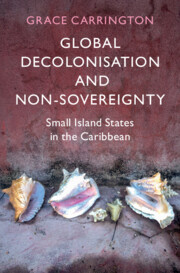Refine search
Actions for selected content:
8 results

Global Decolonisation and Non-Sovereignty
- Small Island States in the Caribbean
-
- Published online:
- 16 September 2025
- Print publication:
- 31 July 2025
4 - The Political Economy of Non-Sovereign States during Decolonisation
- from Part I - Non-Sovereign States in the Context of Global Decolonisation
-
- Book:
- Global Decolonisation and Non-Sovereignty
- Published online:
- 16 September 2025
- Print publication:
- 31 July 2025, pp 115-136
-
- Chapter
- Export citation
7 - ‘We Got to Take Back Our Country’
- from Part II - Local Dynamics of Decolonisation
-
- Book:
- Global Decolonisation and Non-Sovereignty
- Published online:
- 16 September 2025
- Print publication:
- 31 July 2025, pp 196-231
-
- Chapter
- Export citation
2 - Decolonisation and the Global Cold War
- from Part I - Non-Sovereign States in the Context of Global Decolonisation
-
- Book:
- Global Decolonisation and Non-Sovereignty
- Published online:
- 16 September 2025
- Print publication:
- 31 July 2025, pp 59-87
-
- Chapter
- Export citation
3 - The Colonial State
- from Part I - Non-Sovereign States in the Context of Global Decolonisation
-
- Book:
- Global Decolonisation and Non-Sovereignty
- Published online:
- 16 September 2025
- Print publication:
- 31 July 2025, pp 88-114
-
- Chapter
- Export citation
1 - Political Futures after the Second World War
- from Part I - Non-Sovereign States in the Context of Global Decolonisation
-
- Book:
- Global Decolonisation and Non-Sovereignty
- Published online:
- 16 September 2025
- Print publication:
- 31 July 2025, pp 27-58
-
- Chapter
- Export citation
6 - Local Politics
- from Part II - Local Dynamics of Decolonisation
-
- Book:
- Global Decolonisation and Non-Sovereignty
- Published online:
- 16 September 2025
- Print publication:
- 31 July 2025, pp 173-195
-
- Chapter
- Export citation
5 - Local Elites
- from Part II - Local Dynamics of Decolonisation
-
- Book:
- Global Decolonisation and Non-Sovereignty
- Published online:
- 16 September 2025
- Print publication:
- 31 July 2025, pp 139-172
-
- Chapter
- Export citation
